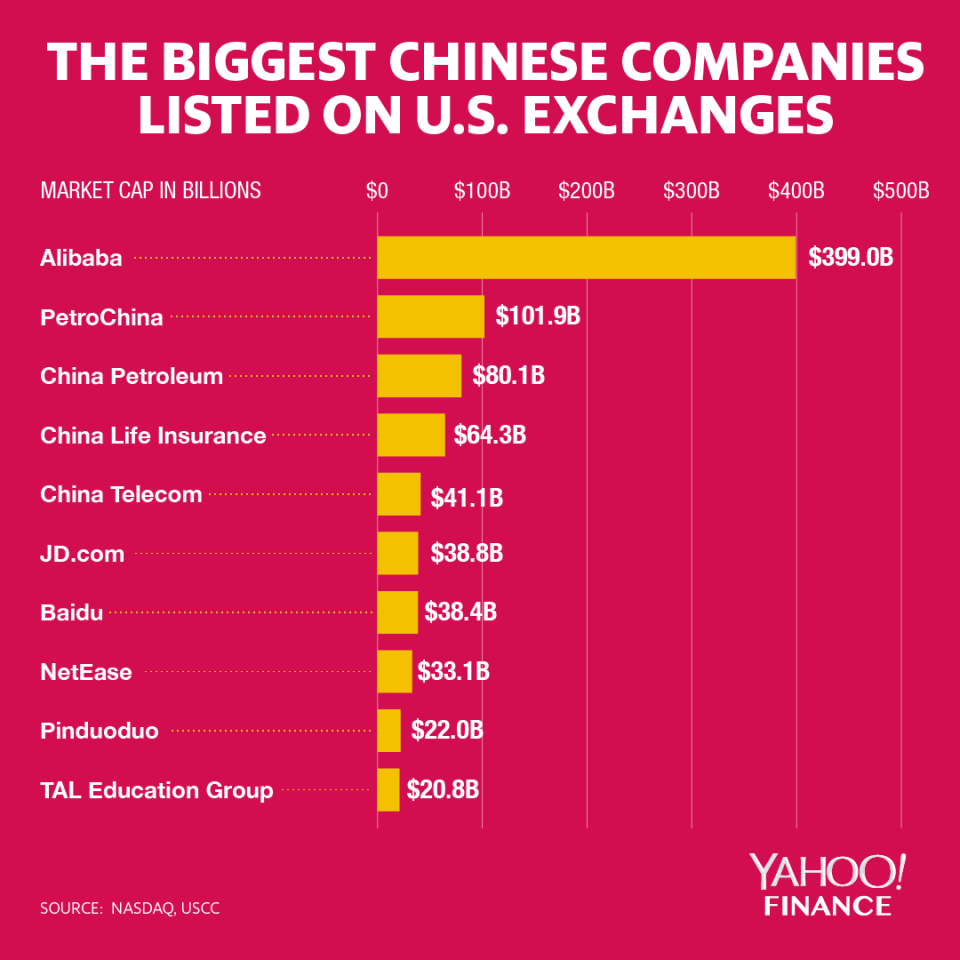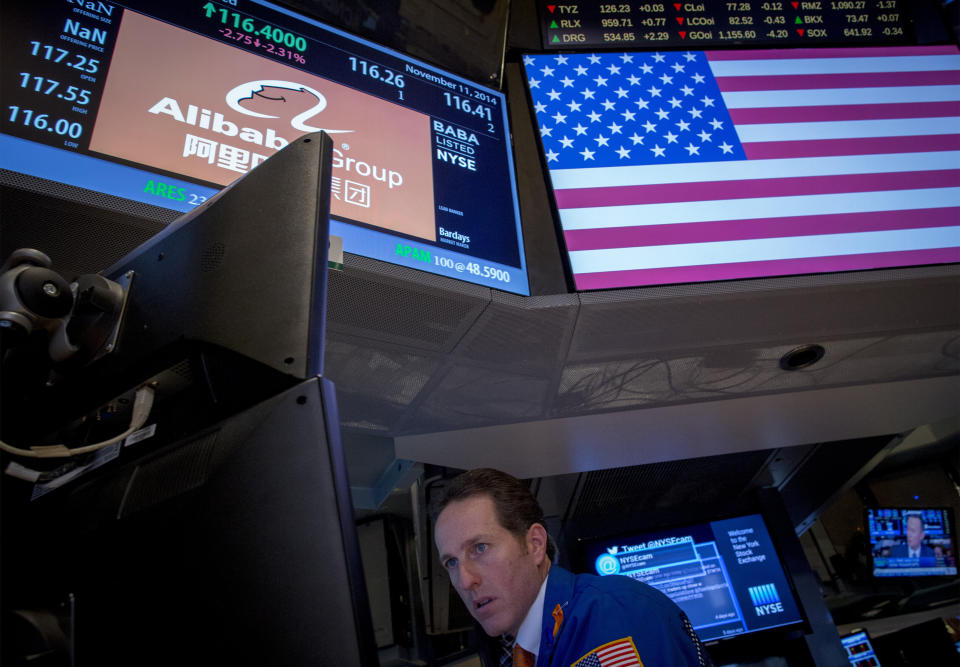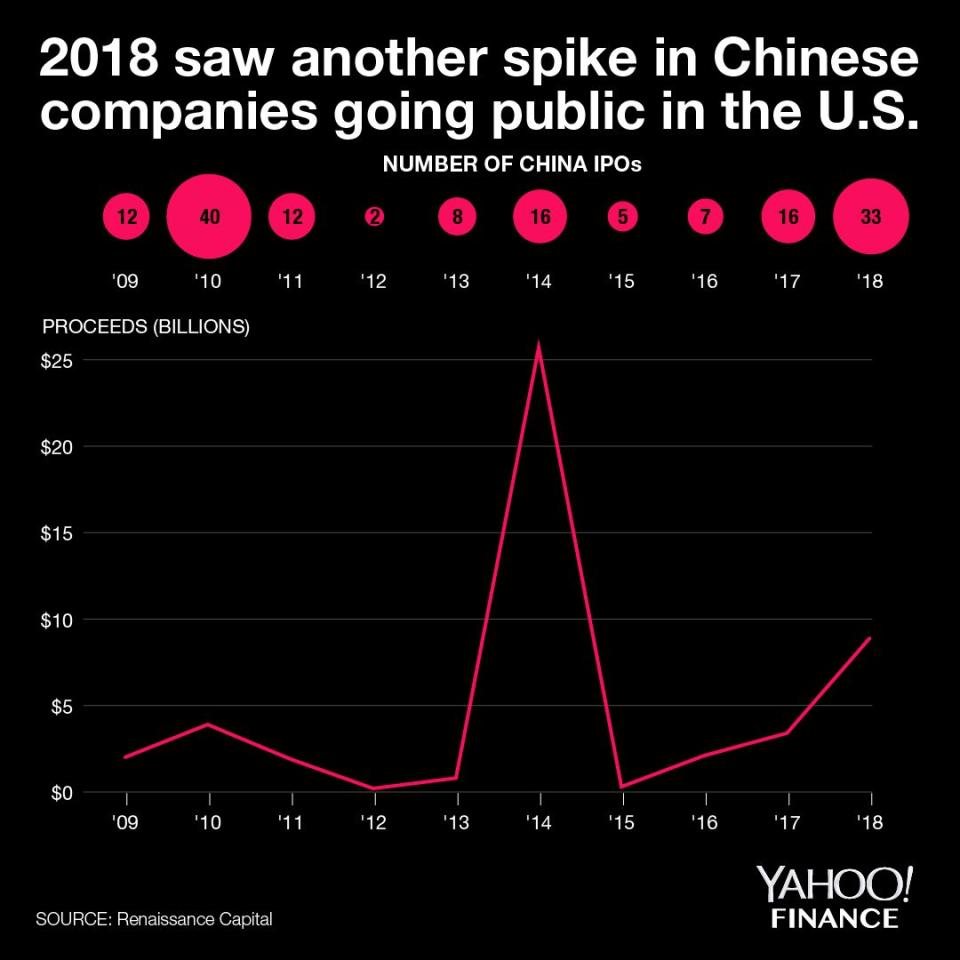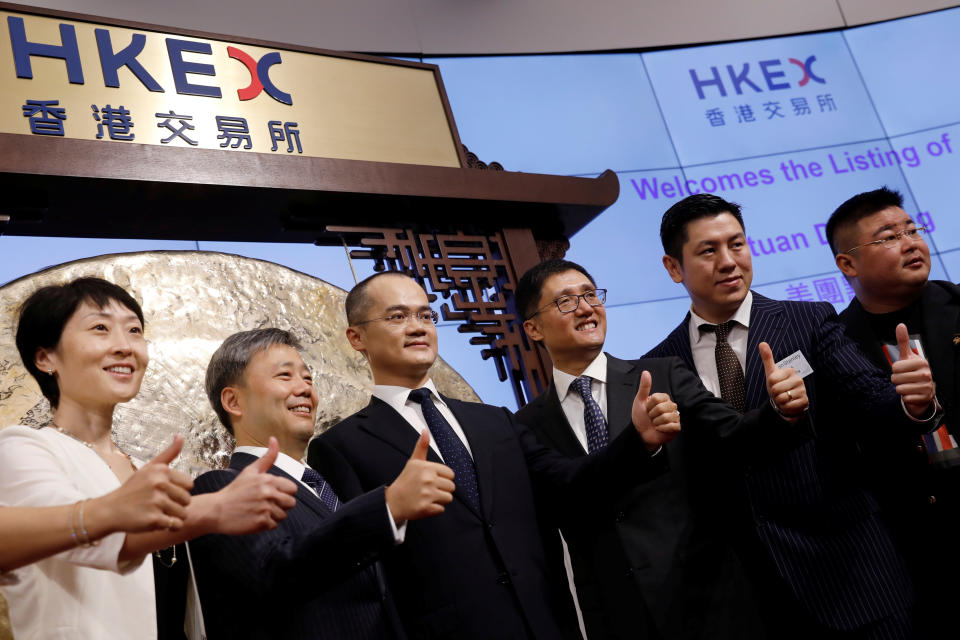New bipartisan bills threaten Chinese IPOs and Chinese companies listed in the U.S.
American stock exchanges have emerged as the latest battleground in the ongoing political fight between the U.S. and China. While bilateral discussions on trade have made little headway in recent weeks, Republican and Democratic lawmakers on Capitol Hill have aggressively moved forward with legislation that increases oversight for more than $1 trillion worth of U.S.-listed Chinese companies, putting stocks like Alibaba (BABA) in the spotlight and future listings on these exchanges in question.
“We welcome investment from companies from China so long as they are complying with other laws,” Senator Chris Van Hollen (D-MD) said, speaking to Yahoo Finance. “But they should play by the same laws as everyone else. Those rules are designed to protect American investors and to protect confidence.”
Two bipartisan bills have been introduced over the last few months, aimed at going after Chinese companies that don’t comply with auditing rules in the U.S.

Van Hollen’s bill, which was co-sponsored by Sen. John Kennedy (R-LA) and introduced in March, gives listed Chinese firms three years to come in compliance with oversight requirements of the PCAOB, a non-profit corporation Congress created in 2002, in an effort to restore reporting credibility.
A similar bill was introduced this week, sponsored by Sen. Marco Rubio (R-FL) and Democratic Senators including Kirsten Gillibrand (D-NY) subjects U.S.-listed Chinese companies to the regulatory oversight that includes turning over its audits or face delisting.
“President Trump has created an unprecedented opportunity for the U.S. to use its leverage to extract fair, sustainable, and enforceable trade reforms from China,” said Rubio in an Op-Ed published in the Wall Street Journal. “The SEC and [Public Company Accounting Oversight Board] negotiators should use this opening to engage with their Chinese counterparts to bring China into line with international norms.”
Putting the integrity of a U.S. system in another country’s hands
For years, U.S. stock exchanges have attracted Chinese firms looking to take advantage of relaxed rules on profitability, dual-class ownership structure, and access to a large pool of capital. 156 Chinese companies currently trade on the major exchanges, with a combined market cap of $1.2 trillion, according to the U.S.-China Economic and Security Review Commission.
But those same companies have managed to skirt financial auditing by the PCAOB, in part because they operate as Foreign Private Insurers that are subject to regulation in their home country’s exchange. Chinese law requires financial records to remain within the country to protect national security and state secrecy, making PCAOB verification nearly impossible, and raising the risk for accounting fraud.

Van Hollen admits China isn’t alone in its resistance to financial oversight. In fact, Belgium, which has long pushed back against regulatory compliance in the U.S., is in the process of finalizing a cooperative agreement with PCAOB.
The Chinese government has doubled down, calling on Washington to respect its sovereignty, in a white paper published in June, vowing to “not back down” on major issues of principle.
Still, Van Hollen is optimistic the Chinese will come to the table and make fundamental changes to its accounting rules, as part of the broader trade negotiations that have reached a stalemate since President Trump imposed the latest round of tariffs on Chinese imports last month.
“If we had a system where any country could pass domestic laws to prevent their companies from participating, it would essentially put the integrity of our system in other countries' hand,” said Sen. Van Hollen. “I would hope that Chinese companies would put pressure on the government of China to ensure they comply.”
Buyer beware
Despite the lack of accounting oversight, Chinese stocks like Baidu (BIDU) are still widely held by retail and institutional investors, as well as index funds. In 2014, the e-commerce giant Alibaba set the record for the largest IPO in U.S. history, when it went public on the New York Stock Exchange (ICE).
But concerns have been raised, by both the corporations and regulators.
In its latest filing, Alibaba cited lax oversight as a risk factor saying, “The inability of the PCAOB to conduct inspections of auditors in China makes it more difficult to evaluate the effectiveness of our auditor's audit procedures or quality control procedures as compared to auditors outside of China that are subject to PCAOB inspections. Investors may lose confidence in our reported financial information and procedures and the quality of our financial statements.”

In 2012, the SEC sued the Big Four firms, for failing to hand over audit work of companies suspected of accounting fraud. That led to a $500,000 fine for each firm, and admission of failure to comply with regulations. The SEC and PCAOB singled out China again last year, issuing a joint statement that called for improved access for U.S. regulators investigating the business practices of companies traded on America exchanges.
“This is really a story of buyer beware,” Daniel Taylor, an associate professor of accounting at the Wharton School, told Yahoo Finance. “If retail investors say we don't really care about the PCAOB, we still want to buy the stock, that's fine. The question is do they know that the firm’s audit engagement isn't being audited by the PCAOB.”
The market does care about the extra oversight by PCAOB, according to a study by researchers at Stanford University and the University of Chicago. The research has found that the market perceives that the firm compliant with the PCAOB have higher quality earnings and that their financial statements are more reliable and more credible, which in turn is priced in capital markets.
Even if investors avoid Chinese stocks due to accounting concerns, the quality of the U.S. capital markets risks going down because of the large influx of Chinese companies going public in the U.S. Last year alone, they accounted for 17% of the total IPOs in the U.S. Even when investors don't hold any direct ownership in Chinese firms, they are still exposed to more volatility as an index investor.
“For Mr. and Mrs. 401k, you want to make sure that they have high-quality investments that they're not exposed to increased risk of fraud and whatnot,” Professor Taylor said.
Any legislation could mean fewer IPOs in the U.S.
Any law requiring Chinese companies to open its books to U.S. regulators is likely to push future IPOs closer to home, at a time when exchanges across Asia are vying for Chinese money.

Hong Kong’s HKEX has been especially aggressive, changing its listing rules to attract big tech names like smartphone maker Xiaomi and food delivery service Meituan Dianping in 2018. That propelled Hong Kong to the top of the world’s IPO market last year, though it has lagged behind the New York Stock Exchange and the Nasdaq (NDAQ) so far this year.
At least one company may already be looking to list there. Alibaba is reportedly considering a secondary listing in Hong Kong to raise as much as $20 billion, after its attempt to get dual-listed in mainland China in 2018 failed. Many Chinese companies believe being close to home could help with the valuation as investors there are more familiar with their businesses.
“If [the proposed legislation does] pass, I would expect China to encourage Chinese companies to de-list in the US and re-list in Hong Kong or elsewhere,” Scott Kennedy, senior advisor at the Center for Strategic and International Studies, said to Yahoo Finance.
In a note to clients, Morgan Stanley said Rubio’s bill has the potential to “cause significant changes in the listing domains of Chinese firms,” while capping the valuation multiple for China equities.
Taylor says such legislation is likely to result in fewer IPOs in the US.
“I think there is a tradeoff between the number of companies listed on U.S. markets and the quality of those companies listed on U.S. markets,” he said. “If you require higher quality thresholds and that will reduce the number of companies listed.”
—
Akiko Fujita is an anchor and reporter for Yahoo Finance. Follow her on Twitter. Krystal Hu covers tech and China for Yahoo Finance. Follow her on Twitter.
Read the latest financial and business news from Yahoo Finance
Follow Yahoo Finance on Twitter, Facebook, Instagram, Flipboard, SmartNews,LinkedIn, YouTube, and reddit.